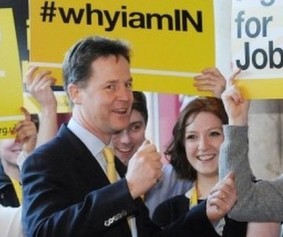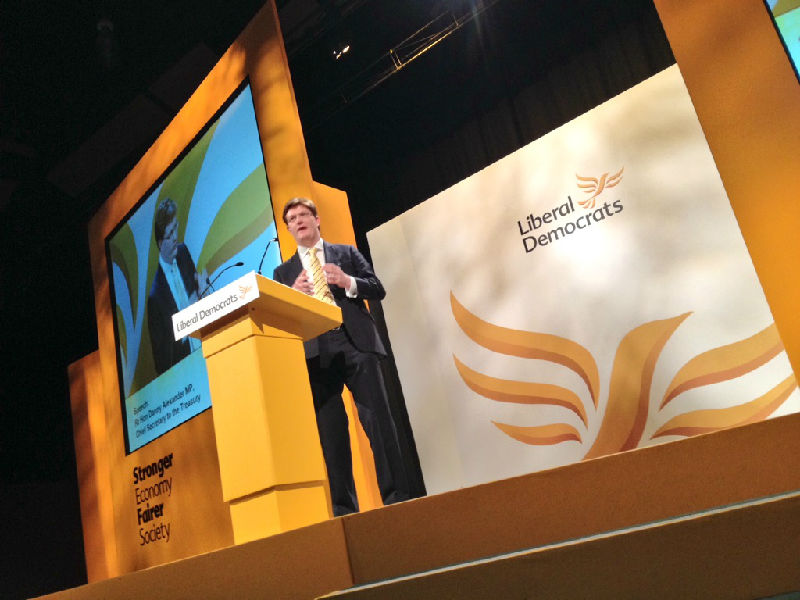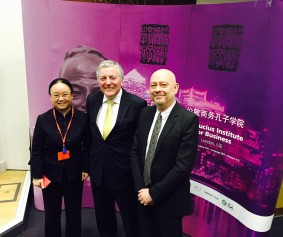Lord C-J on Startups: Financing getting better but major skills gaps
In many respects the Queen’s Speech is to be welcomed, precisely for the fact that it does not contain a huge amount of new legislation. None the less, I welcome the carryover of the Consumer Rights Bill and the Deregulation Bill. Curiously, I note for the aspiring statesmen among us that it will, among other things, make statues easier to erect. I do not know whether your Lordships noticed that.
Nick Clegg: We're IN
Deputy Prime Minister Nick Clegg kicks off the European Election Campaign and the General Election Campaign too!
http://www.bbc.co.uk/news/uk-politics-26504083
Danny Tells the Lib Dems' Record on the Economy
Excellent speech from Danny Alexander the Chief secretary at the Lib Dem's Spring Conference in York. A Stronger Economy and a Fairer Society indeed.
http://www.libdems.org.uk/danny_alexander_s_speech_to_spring_conference
TIF in Qingdao Debates Intellectual Property Protection
At the recent Technology Innovators Forum- TIF-In Qingdao I chaired a Roundtable session on IP. The aim was to provide practical suggestions for British and Chinese companies to maximise revenues and mitigate risks and identify follow up actions that can be taken on an industry to industry basis and/or to include in future government to government discussions.
In the earlier finance panel at TIF-IN the conversation rapidly moved on to the question of IP . The view of that panel was clearly that financing in this field becomes more uncertain and more unattractive without proper protection of this vital asset.
In our roundtable we were assisted by an expert panel:
- The UK IP attaché to China Tom Duke
- Max Hole, Chairman and CEO of Universal Music Group
- Guo Biao, China Director at the International Federation of the Phonographic Industry (IFPI) and Senior international music industry representative in Beijing,
- Mark Devereux, senior partner of media and technology law firm Olswang, Deputy chairman of the British Screen Advisory Council and previously the deputy chairman of the UK Film Council
- Andrew Wajs, the Chief Technology Officer of Irdeto an expert in the technology of protecting IP
We looked at the environment for Intellectual property development and protection applicable to the creative industries, internationally, and in China in particular and posed a number of questions.
- Is it common ground in fact that good IP protection is essential to underpin our current and likely future business models?
- What are the business models of the future that are best in tune with current protection of IP and the public’s willingness to value it?
- What are the barriers in IP protection and enforcement to exploitation of commercial content? Are the full range of IP rights recognized ? Are IP rights fit for purpose?
- How do we address issues of piracy and criminality in key markets in particular in relation to the internet?
- How to that end do we go beyond enforcement and influence and change consumer attitudes to IP . In particular can we educate young people that creators have rights and there is fundamental value in IP? Are there robust technological solutions to piracy and infringement? Can brand owners and credit card companies be persuaded to avoid rogue sites?
- Copyright in particular, is changing across the world to adapt to new conditions. Is this in the right direction?
- In China the IP protection regime is rapidly changing- for the better as several of our speakers yesterday emphasised – as Chinese homegrown IP grows in importance.But what are the current IP risks in China, whether in due diligence, contractual terms or legal provision and enforcement when doing business in China.
- What local action is needed to mitigate these risks?
- How are different aspects of IP treated eg know how, copyright and trademarks?
- How will all this impact on the future for UK-China creative industry partnerships in the sector?
"The regulatory and and legislative reform side and the development of education of the public and others in the value and importance of IP to the creative industries, both for their future viability and in their ability to deliver quality content."
— Lord Clement-Jones
Much of the discussion on this topics will be ongoing but it is clear that two strands are key:
The regulatory and and legislative reform side and the development of education of the public and others in the value and importance of IP to the creative industries, both for their future viability and in their ability to deliver quality content.
On the former front we need to stay abreast of the new business models and ensure reform in China and elsewhere is timely to enable creative content to be exploited. In particular performing right needs to be recognised in China. Some collecting societies need reforming too.
Positive technology and business models are emerging in the mobile sector in particular, but clear copyright laws are needed at the same time.
On the education front there is much that can be done to change attitudes to IP among the public and among search engine sites, brand owners and credit card companies. The BFI model is one that could be pursued by others.
It was the hope of many that the new Global Digital Media and Entertainment Alliance (GDMEA)will prove a useful vehicle for dialogue on IP and ensuring copyright reform in China alongside education initiatives.
Happy New Year of the Horse!
The 31st January this year marks the start of the Chinese New Year.
Gong Xi Fa Cai in Mandarin and Kung Hei Fat Choi in Cantonese to you!
The Horse is an energetic creature and apparently "the fire energies will be strong" this year. So let's make the most of it!
Britain and China: A Creative Partnership : LSE Confucius Institute Lecture
Government Agrees with Peers to Put Fans First
Earlier this year the Coalition Government agreed a compromise on the Consumer Rights Bill with proponents of transparency measures to prevent ticket fraud and by secondary ticket sellers.
As a signatory to the original amendment and a member of the All-Party Group on Ticket Abuse I paid tribute to Lord Moynihan, Sharon Hodgson MP, Mike Weatherley MP and Lady Heyhoe Flint for their roles in the campaign and their for their efforts in securing this agreement, which will benefit music and sports fans immensely.
Here is what I said:
http://www.publications.parliament.uk/pa/ld201415/ldhansrd/text/150224-0001.htm#15022465000505
We are now waiting for the new Conservative Government to set up the review of the law governing Secondary Ticketing as promised in the last Parliament and enshrined in the Consumer Rights Bill. I asked a question in the Lords about this recently and this is the reply I received
To ask Her Majesty’s Government when they intend to commence the review of the consumer protection measures for the secondary ticketing market under section 94 of the Consumer Rights Act 2015; and who will undertake it.
The Parliamentary Under-Secretary of State, Departments for Business, Innovation and Skills and for Culture, Media and Sport (Baroness Neville-Rolfe) (Con): My Lords, work on appointing the chair and expert group is well advanced and the review will proceed once this and the terms of reference are finalised. We are aware of our statutory obligation to publish a report on its findings by 26 May 2016.
Lord Clement-Jones (LD): My Lords, I thank the Minister for that reply but ticket fraud continues to soar this summer. Circle Tickets has defrauded hundreds of music fans just this June while the RFU reports zero compliance with the Act for World Cup tickets, so the problem remains acute. This review is enshrined in statute as a result of the efforts of the noble Lord, Lord Moynihan, and others only recently. We are now two months out from the general election. When will this review start, will BIS or the DCMS oversee it and what will its scope be?
Baroness Neville-Rolfe: My Lords, as I have said, we will publish details of the review shortly. I share the noble Lord’s disappointment on the enforcement side and, prompted by his Question, I spoke to the City of London Police only last week. I was reassured about some of the actions it is taking, both on its own and with the cultural and sporting bodies, for the important events of this summer. As the noble Lord
Here is the original piece I wrote after the vote in the Lords in November
The House of Lords has handed a big boost to music, sport and comedy fans as a cross-party coalition of Peers yesterday passed an amendment to curb the actions of ticket touts.
In a defeat for the Government, Peers forced through a new clause to the Consumer Rights Bill to increase transparency in the ticket resale market.
The new provisions, passed by 183 votes to 171, will mean that touts selling their tickets through major internet platforms like Seatwave and Viagogo will have to prominently disclose key facts to potential customers, including:
- Their identity, particularly where they are selling tickets as a business;
- The original face value of the tickets being sold;
- The individual characteristics of the tickets being sold, such as the seat number or the booking reference, and;
- Whether the terms and conditions on the ticket mean that it can be cancelled if the organisers find out it has been resold.
It is hoped that the information being made public will enable event holders to identify the largest ticket touts and prevent them from buying up large quantities of tickets to re-sell, leaving ordinary fans with no choice but to pay inflated amounts on the secondary market.
The latest high-profile tour to be affected is that of Fleetwood Mac, with thousands of tickets being resold on the secondary market at way above face value within minutes of the tour selling out. Similarly, next year’s Rugby World Cup has been plagued by touts reselling tickets to England games.
The amendment follows a similar attempt in the Commons earlier in the year. Both amendments were informed by a report from the All-Party Parliamentary Group on Ticket Abuse, which held an inquiry at the beginning of the year into the secondary ticketing market.
Liberal Democrat Peer and signatory to the New Clause, Lord Tim Clement-Jones, said: “This is a victory both for the ticket-buying public and for the hugely important live event industry. The Police and the entertainment industry have been clear that action needs to be taken on ticket touts to ensure that genuine fans can get access to gigs, shows and games without having to pay extortionate prices, and these new measures would do exactly that.”
Labour Co-Chair of the All-Party Parliamentary Group on Ticket Abuse, Sharon Hodgson MP, said: “Ticket touts have operated with impunity for far too long. In no other market would we put up with not knowing who we were buying from or whether they even had permission to sell us a product. This amendment is a significant step towards tackling the scourge of touts and putting fans first, and I hope that the Government now listens to the will of Parliament.”
Conservative Co-Chair of the All-Party Parliamentary Group on Ticket Abuse, Mike Weatherley MP, said: “It’s been clear for a long time that this market is not working in the interest of genuine fans or the people who put in all the hard work and investment to put on live events. Anyone operating honestly has nothing to fear from these changes, but they will make a big difference for ordinary fans. It’s imperative that the Government doesn’t try to reverse this amendment when the Bill comes back to the Commons.”
See the Report in the Evening Standard
Lord C-J looks to the Future of IP policy
I recently gave a speech to the Inside Government Intellectual Property 2014 Conference
Here is the text.
Intellectual Property Policy:The Way Forward
In modern times Britain has become renowned in for its creative industries, in particular for pre-eminence in the world of pop and rock music, for the work of its designers and architects and for its television and film content and formats. We are now coming to the fore in fashion and computer games.
This creative output comprises one of the UK's great assets.The UK’s creative industries are now worth £71.4 billion per year to the UK economy, at least 5% of the UK Economy and 10 % of all UK exports.
Sector growth outperforms all other sectors of UK industry and it now accounts for almost two million jobs.
A crucial factor in recent growth has been the tax treatment of film production. This has been followed by high end television and animation and in April the video games relief was cleared by the EU. The new theatre production tax relief and patent box will have a major impact too.
In July we saw launch by the Creative Industries Council of Create UK, the creative industries strategy. Its aim is to double the sector’s annual exports to £31 billion by 2020.
At the launch Vince Cable announced a £16m funding package to boost skills in the creative industries. This injection of capital investment is part of the Government's strategy to support the UK's position as a world leader in the sector.
Create UK calls for a “stable legal framework that allows rights to be protected and commercialised” and says “any consideration of amendments to the IP frameworks” needs to be “thorough, objective, evidence-based and transparent”.
This however has been far from the case since the conclusion of the Report by Professor Ian Hargreaves in 2011 designed to set out how the intellectual property framework can promote innovation and economic growth in the UK economy.
The impression given by the Report was that intellectual property rights are a barrier to innovation.
Even as far back as the landmark Statute of Anne in 1710 however the benefits of copyright, particularly the rights of creators, were recognized.
Indeed the title of the Act is: “An Act for the Encouragement of Learning, by Vesting the Copies of Printed Books in the Authors or Purchasers of Copies.., etc”
As a result the provisions of the Digital Economy Act passed in the washup before the General Election of 2010, which would have given the creative industries some protection from digital piracy, remain unimplemented.
I myself in trying to make sure that there were greater powers to block infringing websites found myself depicted as an internet villain!
Luckily and thanks to the industry the Newzbin2 case brought by the MPA and the UK Pirate Bay case have established that an existing provision of the CDPA 1988 is effective in taking down these sites.
Following the Hargreaves Report we have had the Enterprise and Regulatory Reform Act which set out the legal basis for introduction of new copyright exceptions, Extended Collective Licencing and the treatment of Orphan Works.
It is hard to see, despite the elaborate process undertaken to introduce Exceptions, what major positive impact any of these with the possible exception of Parody, will have.
Indeed in a number of cases they seem to militate against the commercial licensing solutions being made available by rights owners.
Extended collective licensing and orphan works provisions have a narrow UK application and similarly are unlikely to make a major impact.
One area where there have been positive development is in the field of designs.
The ERR Act ensured that works of Artistic design would be protected (think chairs!) with the repeal of s52 now under consultation and the Intellectual Property Act introduced a criminal penalty for infringement of registered designs.
Admittedly some of us felt this should go further in the light of the fact that protection for 2D is so much better than for 3D.
Moreover in the end the provisions of the Bill were watered down so the test of whether a design was “substantially” copied was replaced by “with features which differ only in immaterial detail” for the purposes of criminal prosecution.
The ERRA also laid the ground for Collecting Societies Codes of Practice which lay down minimum standards of behaviour. Given the power of the collecting organizations this was welcome.
One major and welcome fruit of the Report is however the Copyright Hub which made a bright start thanks to Richard Hooper and Dr Ros Lynch. Compared with nearly all the other reforms the voluntary solution of the Copyright Hub is highly likely to have a major impact combined with international application.
The Hub has received £150k in goverment funding. According to its new director Dominic Young it is changing from “signposting tool” into an “intelligent router” and it will make a major difference in taking down the barriers to effective copyright licensing.
But it will be shortly totally reliant on private sector business funding and I hope the industry will make sure that it goes on to be a great success with the necessary resources.
If it does, it has the potential to be a Global Hub for copyright licensing. London and the UK could be at the centre of a hugely significant and powerful means of ensuring that creators receive the fruits of their endeavours worldwide.
We are also making strides in music licensing through the Global Repertoire Database RD which has its Operations HQ in London
Throughout the reform process the creative industries sector have been concerned by the potential negative impact the reforms could have, with the potential to deter investment, risk jeopardising market-led developments and weaken performer/creators ability to benefit financially from their work.
Changes to IP law should be adopted only in response to a well defined public policy objective and market failure. They should be underpinned by robust Impact Assessments. In fact the quality of these has been poor.
Reform of copyright should be handled sensitively with the value of the creative industries, and any negative impact caused by changes to the law, firmly in mind and this has clearly not been the case.
Furthermore investment in the UK's creative industries can only really make a difference if the industry's intellectual property rights, particularly relating to the protection of their online materials, are properly enforced.
The industry has changed dramatically in the wake of the digital revolution. That there is a major issue regarding online intellectual property theft, in the form of illegal downloads accessed via pirate websites, is beyond dispute.
Communications watchdog Ofcom revealed last year that a staggering 1.5 billion files were illegally downloaded in 2012.
The MPAA in their report “Understanding the Role of Search in Online Piracy” assess the value lost through of piracy in the UK at £400m pa for music and film alone.
Indeed, the issue of intellectual property theft goes beyond the creative industries and impacts financial, professional and support services - industries that collectively form the backbone of the UK economy and the 'knowledge-based' economy that the UK has long relied upon for success.
The Chancellor George Osborne has recently spoken about promoting Britain's financial technology industry - or FinTech - as a global pioneer in alternative funding vehicles and digital currencies, such as Bitcoin.
However, the UK cannot hope to become a leader in this field without rigorous IP protection and enforcement.
The post Hargreaves reforms are not designed to prevent online piracy.
Advertising, often by well known brands on pirate websites, is propping up the pirates and encouraging them to continue in their IP theft activities.
The Police Intellectual Property Crime Unit (PIPCU), a specialist IP crime unit within the City of London Police, has been engaged in activities designed to disrupt the flow of money from advertisements to those that run copyright infringing websites.
The Follow the Money initiative led by Mike Weatherley MP, the former intellectual property adviser to the Prime Minister which is designed to get voluntary agreement from the advertisers and credit card companies not to advertise on these sites is a significant and welcome development.
The fact remains though that IP piracy represents an existential threat to the UK creative industries and the Government needs to put an emphasis on enforcement if it is to help the industry assert its intellectual property rights and combat the online pirates.
Major search engines have an important role to play too. They have often had an uneasy relationship with the likes of the BPI who demonstrate that illegal sites persist in coming high on search rankings despite literally millions of infringement notifications to them.
Google have recently announced moves which will downrank illegal download websites in searches.
There also needs to be a coordinated push to educate people of the importance of IP and of only downloading legitimate material via legal websites. This ordinarily means of course that people must pay for content and be strongly discouraged from illegal downloading.
The recent report Copyright Education and Awareness published this month by Mike Weatherley and rights holders such as the PRS is a greatly welcome development.
Of course he has already made a major contribution to IP education through Rock and Film the House which he founded.
We shall have to erect a statue to him when he leaves Parliament next year!
A key recommendation is about the IPO and a recommendation that there a broader IP Director General role is created along the lines of the US IP Tsar.
The Culture Media and Sport Committee rightly in its report last year raised a question mark over the Intellectual Property Office’s ability to be a strong IP champion but with recent personnel changes to that office I am much more optimistic that a major change in mindset is occurring.
The fact is however if the UK creative industries are to remain the powerhouse they currently are, people need to pay for creative content that the industries produce.
There are a number of vital aspects that need attention:
- The protection of IP must be rigorously enforced and the Government should consider either implementing the provisions of the Digital Economy Act or ensuring that robust voluntary arrangements exist with the internet service providers, so that piracy is detected and deterred.
- Digital copyright infringement sanctions need to be enhanced. We urgently need to equalise the maximum penalties for digital and physical IP infringement. I look forward to the outcome of the Government’s current review of the use of copyright infringement sanctions which is expected to report in November.
- We need to ensure too that there is a common understanding across the creative industries of what metadata needs protecting and how to do this. We need general acceptance of the Voluntary Code of Practice for Creating and Retaining Metadata in Images.
- PIPCU –the Police Intellectual Property Crime Unit-is a vital resource in combatting counterfeits and infringers. It has made a huge impact in its first year of operation. We -Government and industry- need to ensure its future funding beyond 2015.
- Then of course during the passage of the Consumer Rights Bill I have been arguing for better protection against lookalike products which whilst falling short of being counterfeit nevertheless are designed to give the cynical impression through sailing close to IP infringement that they are equivalent to the original product.
- 3D printing is already throwing up important issues. What forward thinking has been carried out by the IPO?
As it is there are major other issues coming down the track from Brussels. After an EU discussion paper in 2011 on the Single Market for Intellectual Property Rights debate will take place on matters such as user generated content, further artists resale rights and other reforms.
DG Markt and DG Connect are clearly at odds. Where does the UK stand in this debate? In fact we need a great deal more European cooperation through for instance the European Union Observatory on the Infringement of Intellectual Property Rights rather than a raft of reforms.
The recent International Summit IP Enforcement Summit hosted by BiS and the IPO in London, designed to co-ordinate strategy and action was exactly what is needed.
The international dimension of IP is important to our ability to monetize our creativity overseas. I chaired an IP roundtable at a TIF-IN Conference in Qingdao, China for the creative industries and IP protection is a fundamental issue in doing business in emerging markets.
To its credit the Government have placed IP attaches in major markets such as China and Brazil which can advise UK companies on the IP landscape.
In conclusion.In the UK we have the potential to be the recognized world leader in the development of the digital economy.
But of course now in the digital economy there is increasing convergence –indeed symbiosis- between platform and content, between the tech sector and the creative industries.
creative industries.
There is no doubt that each sector is increasingly making use of relevant skills in the other and that of course means valuing the intellectual property of each other.
In recent otherwise excellent manifestos from the TechUK –which I helped to launch-and from COADEC there is no mention of Intellectual Property.
So my parting shot to the Tech sector is, please acknowledge digital realities, you and the creative industries need each other so recognize the value of IP and the fact you have a common interest in protecting it!
Thank you
Ming : 50 years that changed China
A fantastic exhibition at the British Museum! Well worth a visit!
As the BM say:
The exhibition explores the years 1400 – 1450, a pivotal 50 year period that transformed China during the rule of the Ming dynasty. In this period the capital is established in Beijing and the borders of China are fixed as they are today. Bureaucrats replace military leaders in the hierarchy of power, the emperor’s role changes from autocrat to icon, and the decision is taken to centralise, rather than devolve, power. The exhibition includes rare loans of some of the finest objects ever made in China, shedding light on this important part of world history that is little known in Europe. China’s internal transformation and connections with the rest of the world led to a flourishing of creativity from what was, at the time, the only global superpower."
Lord C-J helps to launch techUK manifesto for growth and jobs
I recently went to techUK where Julian David their Chair and Charlotte Holloway their Head of Policy launched their Manifesto for growth and jobs.
Ed Vaizey, Minister for Culture & Digital Industries, Iain Wright Shadow BIS Minister and I gave our responses to the recommendations and outlined our parties' visions for digital and tech policy post-2015.
Here is what I said:
I am delighted to be here at the launch today of techUk’s Manifesto.
It strongly reinforces and complements the Start up Manifesto from COADEC published this month and the Report "Connected Cities" from Jim O'Neil's City Growth Commission published in July. Singing from the same hymn sheet.
I can't comment at length. But I want to deal in turn with a few key aspects set out in the manifesto.
First , Access to Finance
I agree need to ensure that Tech companies at every stage have access to the Finance they need to grow and can stay in London.
We've successfully tackled access to early stage equity finance through the Government's Seed Enterprise Investment schemes it's one of the most generous early stage tax breaks available anywhere in the world.
Tech companies have also benefited from a range of Government investment and support schemes, including the Business Growth Fund, Enterprise Capital Funds (ECF)and the Enterprise Finance Guarantee (EFG),
It is the later stages of equity finance where we are behind Silicon Valley and Nasdaq in New York. Problem of business accessing finance to achieve scale. There is a danger of businesses moving to the US at this funding stage.
No solution yet although the LSE looking at this and there is evidence from recent listings on the Stock Exchange that the creation of the new High Growth Segment to encourage companies to list here is having an impact. Look forward to Sherry Coutu’s report mentioned in the Manifesto
As regards debt finance with very limited exceptions the banks are failing SME's and start ups but Crowd funding is beginning to have a real impact and it is good that fund such as Funding Circle are receiving government suppor through the Business Finance Partnership scheme (BFP).
Loans through Crowd funding have recently hit the £2bn mark.
The Lib Dems don't propose waving a magic wand but in our pre manifesto explicitly we want to facilitate new entrants to the banking sector, including through public procurement policy, so that there is much more choice and variety of competitors in banking, in particular business banking and encourage the growth of crowd funding and alternative finance models, .
We also echo the Manifesto in supporting innovation through greater public funding on a longer timescale, with a ring-fenced science budget, more ‘Catapult’ innovation and technology centres.
I am glad to see praise for Catapult centres . The Euston Connected Digital Economy catapult has worked diligently with Dominic Young and his team to develop the Copyright Hub. But they are a well kept secret and their work needs to be promoted.
Skills
The talent available however is far below what we need. Start ups need a mixture of technical and creative skills to develop their new digital services. The manifesto quotes my colleague Baroness Lane-Fox in saying we need 1 million tech jobs to be filled by 2020 to keep up with demand.
I welcome the mandatory inclusion in the curriculum of coding/computer science from this September for 5-16 year olds, the first in the G20 Also welcome the involvement of the tech sector in Code Clubs.
But even if the pipeline from schools was finding the right talent programmers fresh out of college are not necessarily up to the job. Training and proper apprenticeships are hugely important.
•Lib Dems are keen to increase the number of apprenticeships and improve their quality, extending the Apprenticeship Grant for Employers for the remainder of the next Parliament, delivering 200,000 grants to employers and expanding the number of degree equivalent Higher Apprenticeships.
• Develop National Colleges as national centres of expertise where there is demand and an identified need, to deliver the high level vocational skills that businesses need in these areas
That said we will still be reliant on the skills of overseas undergraduates and post graduates and we should welcome them.
As the Manifesto makes clear -reinforced by a recent report from universities Uk and an earlier report from Policy Exchange--we must change policies towards overseas students
I welcome the call for a smart migration policy. It's no secret that there is a difference of emphasis between the coalition parties on this. Can’t chase unrealistic targets in trying to reduce in net migration at the expense of growth in the digital economy.
• In our Pre manifesto we pledge to remove students from our immigration targets given their temporary status, while taking tough action against any educational institution which allows abuse of the student route into the UK.
In my view we need to go further and take the actions suggested by techUk (as does the Start up Manifesto) such as reinstatement of the post study work route visa. I have asked numerous questions on visa policy towards students for the past 4 1/2 years and we are walking towards disaster.
Clusters
The manifesto clearly recognizes the importance of geographic and sectoral balancing of our economy . Correct when the Manifesto says tech economy “more geographically extensive than is often recognized”
And this leads to the importance of clusters. Tech City yes-with 15,000 startups last year and the year before.
70,000 people now employed there. The Tech sector has accounted for 30%of new London jobs since 2009.
But there are so many other places,
- Newcastle Silicon Shore,
- Liverpool with the Baltic Triangle
- Brighton’s so called Silicon Beach
- Dotforge in Sheffield
Also Manchester, Edinburgh, Leeds, Bristol. Birmingham, and Bath.
The role of universities is crucial in all of this.
But how can we strengthen our clusters?
RSA's City Growth Commission chaired by Jim O’Neil takes the view that too many of the UK’s urban areas outside London are failing to achieve their growth potential.
It is of course important that we build on initiatives like the City Deals and the Regional Growth Fund.
The number of City Deals and Growth Deals have grown, not just in the bigger cities but in places such as Brighton and Cambridge too. The Regional Growth Fund has already delivered 99,000 jobs and £1.8 billion of private investment.
But we need to go further.
We need to give the cities greater powers, especially over finance. More than 90% of tax is collected by central government. We need to devolve more economic decision making to local areas and away from national government.
- Our proposal is to introduce ‘Devolution on Demand’, enabling even greater devolution of powers from Westminster to councils or groups of councils working together
- Establish a commission to explore the scope for greater devolution of financial responsibility to English local authorities, and new devolved bodies in England.
We also need much better transport and digital connectivity between what Jim O'Neill and the City Growth commission call Metros.
• Lib Dems propose to Invest in major transport improvements and infrastructure to create a ‘Northern Economic Corridor’; a focus for growth, innovation and prosperity across northern England.
International Dimension
We are already the highest net exporter of computer and information services among the G7 countries and our tech/internet economy accounts for a greater percentage of GDP in the UK than in any other G20 country.
So we need to make sure that digital markets are open.As the manifesto says we need to break down the barriers to E-commerce across the EU to create a genuine European Digital Single Market.
Then there is TTIP the US/EU free trade agreement in the offing.
Jonathan Lord Hill will be an effective advocate for the UK in both. The Lib Dems position on staying in the EU is well known.
Safeguarding and inclusion
Heartening to see techUK’s concerns over online privacy and security. Agree need to demonstrate that security services and corporate sector operate within clear and strict boundaries to ensure that public trust is retained. Cloud security and collection and retention of data have become real issues in the wake of recent events.
Lib Dems have put forward proposals for a Digital Bill of Rights to define and enshrine the digital rights of the citizen, protect people from unacceptable intrusion by the state and by other organisations, and giving people more control over their own data.
It is important that authorities can only accesss personal data where an individual is suspected of taking part in illegal activity.
Child online protection important too. The BBFC is an important part of the voluntary agreements among service providers but mobile standards are better than those for the public WIFI providers
But we must not go too far the other way. We must safeguard the essential freedom of the internet while ensuring the reasonable protection of individuals and businesses.
- The ECJ Spanish Google case establishing a Right to be Forgotten. Entirely agree with the Manifesto that it raises huge concerns.
- Then there is an EU Proposal to drop the exemption from Article 80 of the General Data Protection Regulation for journalists right to investigate in the public interest.
- The office of the Information Commissioner is under resourced.
The manifesto also urges that digital exclusion is tackled.There is still a lack of universal digital skills in Britain. Norway/Sweden by contrast have 97% basic digital literacy. The manifesto asks for a commitment by Government to fund the teaching of basic digital skills of the order of £900 million.
- I can't commit to exact expenditure but Lib Dems certainly commit in our Pre-Manifesto to prioritise expanding digital literacy and connectivity.
Certain omissions
So all in all some very important conclusions which my party strongly supports and will support in any future government.
Let me just briefly however to mention some areas where in my view the Manifesto could have been more explicit.
- Recognize the importance of being world leader in the development of digital economy but doesn’t recognize the increasing convergence between platform content, between tech and the creative industries. There is no doubt that each sector is increasingly making use of relevant skills in the other.
- There is no mention of IP. Digital copyright infringement sanctions need to be enhanced. In the digital space The Follow the Money Initiative against infringing websites very important
- PIPCU is a vital resource in combatting counterfeiters and infringers There is no discussion of its future funding beyond 2015.
In the sum of things however can I congratulate techUK on their Manifesto and pledge my party to work closely in partnership with the industry.










